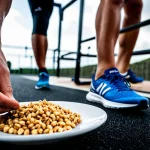Essential Physical Training Regimens for UK Athletes
Physical training for UK athletes varies significantly depending on the sport, with sports-specific routines tailored to the demands of each discipline. Standard regimens incorporate strength, endurance, agility, and skill work to build comprehensive athletic ability. A crucial aspect of effective training is periodisation, where phases of building intensity and recovery are carefully balanced to reach peak performance at competition time.
In the UK, athletes benefit from a unique blend of indoor and outdoor facilities, allowing flexible training regardless of weather conditions. This environment supports continuous adaptation, a key to meeting the varied conditions athletes face nationally and internationally. Adaptation is encouraged through deliberate variation in workouts, promoting both physical and mental resilience.
Also to read : How Does Fan Engagement Impact the Success of UK Sports Teams?
For example, runners focus on interval training and terrain variation, while team sports athletes emphasize tactical drills combined with strength conditioning. This holistic approach helps athletes optimize their fitness in direct response to competition preparation needs. Such regimens ensure they are ready for the physical demands of their sport when it counts most.
Mental Preparation and Psychological Support
Mental preparation is as crucial as physical training for UK athlete training. Athlete mental preparation focuses on building resilience and sustaining concentration under pressure. This ensures competition preparation is not undermined by stress or distractions.
Additional reading : What Role Does Nutrition Play in Enhancing UK Athlete Performance?
What psychological techniques support athletes most effectively? Visualisation allows athletes to mentally rehearse events, improving confidence and reaction. Mindfulness helps maintain focus, reducing anxiety by anchoring attention in the present moment. Stress management strategies, including controlled breathing and cognitive reframing, equip athletes to handle competition demands calmly.
How do UK athletes access psychological support? Sports psychologists form key parts of athlete support teams. They tailor resilience training to individual needs, creating sport-specific routines that integrate mental skills with physical preparation. This collaboration fosters a holistic athlete development model, enhancing overall performance readiness.
UK athlete training benefits from this blend of psychological and physical preparation. By emphasizing mental resilience alongside sports-specific routines, UK athletes develop the capacity to adapt and peak when it counts, reflecting a comprehensive competition preparation strategy rooted in both body and mind.
Nutrition and Hydration Strategies
Effective sports nutrition UK programs form the foundation of optimal athlete performance. Tailored nutrition plans consider the athlete’s sport, training phase, and individual metabolic needs to ensure energy demands are met precisely during competition preparation. For instance, endurance athletes often require higher carbohydrate intake to sustain long-duration efforts, whereas strength-based sports prioritize protein for muscle repair.
How are athlete meal plans customized? Nutritionists analyze training intensity, timing, and recovery needs, creating schedules that balance macronutrients and micronutrients. This approach supports peak performance and accelerates regeneration following strenuous sessions. Supplementation, including electrolytes and vitamins, complements natural food intake, particularly when training volumes increase.
Hydration plays a pivotal role in sustaining performance. Dehydration can impair cognitive function and physical output, making structured hydration for athletics a critical focus. Athletes monitor fluid loss during training via sweat rate assessments and adjust fluid replacement accordingly. This precise hydration strategy ensures optimal thermoregulation and endurance.
UK training environments leverage sports-specific routines by integrating scientifically developed nutrition and hydration protocols. Such comprehensive planning maximizes energy efficiency and supports sustained exertion, crucial for success in the intense competitive schedules faced by UK athletes.
Coaching, Sports Science, and Support Infrastructure
UK athlete training benefits significantly from a robust UK coaching systems framework. Elite coaches bring deep expertise in sports-specific routines, ensuring training aligns precisely with competition preparation goals. These coaches use data-driven insights to refine technique, promote efficient movement patterns, and optimise performance trajectories.
The integration of sports science support is a cornerstone of UK athlete programmes. Facilities provide access to biomechanical analysis, physiological testing, and nutrition advice, creating a comprehensive environment for continuous improvement. Collaboration with physiotherapists and strength trainers allows tailored conditioning and injury prevention strategies. This multidisciplinary approach addresses athletes’ unique demands while adapting training phases through periodisation concepts.
A standout feature of the UK athlete support network is the close cooperation between coaching staff, sports scientists, and medical teams. This synergy ensures feedback loops guide adjustments to training loads and recovery practices. For example, strength and conditioning experts tailor exercises to mitigate injury risk, while analysts interpret performance data to inform tactical tweaks.
In summary, UK coaching systems and sports science infrastructure provide a holistic support network, enhancing athlete resilience and competitive readiness through evidence-based, personalised training interventions. This integrated model exemplifies how collaboration drives success in modern UK athlete training.






